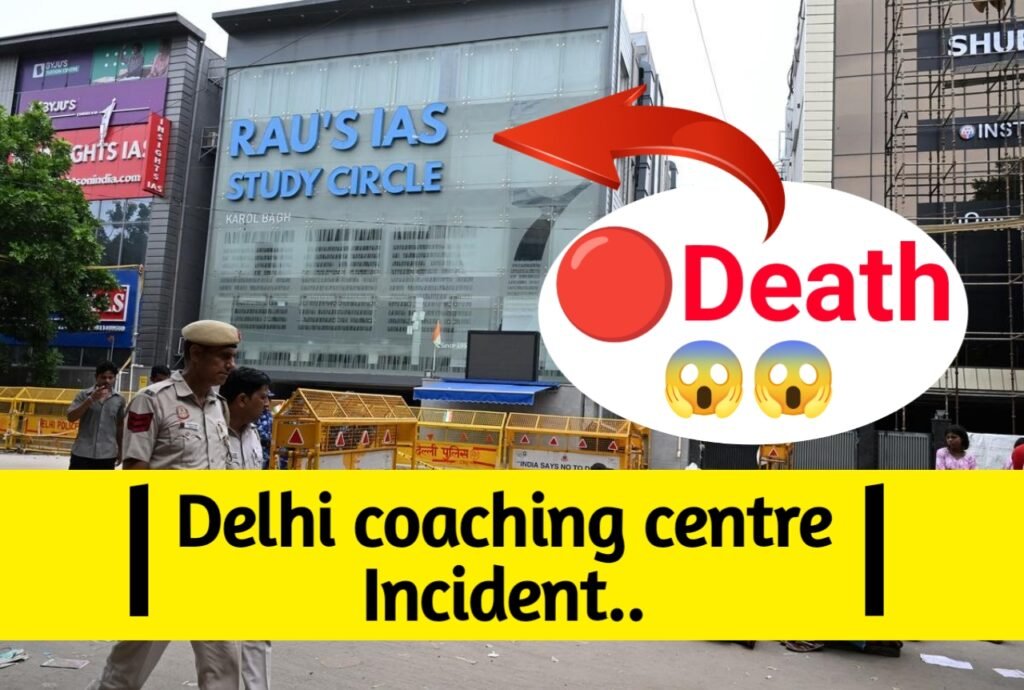In a recent statement, the CBI revealed that the owners of a Delhi coaching center were aware of the risk of water entering the basement. Despite this knowledge, they received Rs 4.5 lakh in rent, raising serious concerns about safety and responsibility.

Delhi Coaching Center Incident:
A month before the unfortunate drowning of three civil services aspirants in the basement of Rau’s IAS Study Circle, a coaching center situated in Old Rajinder Nagar, Delhi, a concerned resident had taken the initiative to alert the MCD about the potential dangers posed by an illegally operated library in that basement area. The resident feared a mishappening could occur due to the unsafe conditions associated with the library’s operation. On Tuesday, the CBI brought this critical information to the attention of a Delhi court, emphasizing that these warnings were raised well before the unfortunate incident unfolded, raising questions about safety regulations and oversight in such establishments.
CBI Prosecutor said: Prashant Kumar, the Senior Public Prosecutor representing the CBI, stated that if a resident was aware of the potential dangers related to the basement, it stands to reason that the building’s owners and the individuals who rented the property should have also been aware of these risks of water entering the basement. This suggests a level of carelessness on their part, as they had a responsibility to ensure the safety of the premises and to address any known hazards. Kumar’s comments highlight the importance of responsibility among property owners and renters, particularly in situations where public safety is at stake.
CBI filed a Chargesheet:
The incident occurred on July 27, but it has taken some time for the legal process to unfold. Recently, the CBI filed a chargesheet against six individuals in connection with the case. This list includes Parvinder Singh, Harvinder Singh, Sarabjit Singh, and Tajinder Singh, who are identified as the co-owners of the building where Rau’s IAS was reportedly running a library in the basement without proper authorization. In addition to these owners, the chargesheet also names Abhishek Gupta, who serves as the CEO of the coaching center, and Deshpal Singh, the center’s coordinator. At present, all six individuals are out on temporary bail as the legal proceedings continue. The case has raised significant concerns regarding safety regulations and the responsibilities of those operating educational institutions.
“Just because these individuals are the owners of the building, why should they be held responsible for the incident? Is there any strong evidence you have against the accused that justifies your claims?” Additional Judicial Chief Magistrate Nishant Garg posed these questions while critically examining the arguments presented by the CBI. His remarks reflect a concern for due process and the need for clear proof when assigning blame, especially in a case involving serious allegations. The magistrate’s inquiry underscores the importance of setting a direct connection between the accused and the alleged wrongdoing before holding them accountable.
In a response to the court, the CBI highlighted that both the owners of the building and the individuals who had rented it were fully aware that the basement was not allowed for commercial use. The CBI pointed out that the rent agreement specified that the basement was designated only for storage and parking purposes. This statement marks the responsibility of the owners and renters to obey to the terms of the rent, which was meant to ensure the safety and proper use of the property. By relying on the rent agreement, the CBI aimed to establish that there was a clear understanding of the drawbacks of the use of the basement, supporting their case against those involved.
CBI also pointed out that the owners had changed the gate:
The CBI also pointed out that the owners had changed a gate that was originally designed to prevent water from entering the basement. This modification indicated that the owners were aware of the risk of water entry and the possibility that the basement could become flooded. By changing the gate, they seemed to acknowledge the potential for water to fill the basement, which raises questions about their responsibility to maintain a safe environment for those using the property. This evidence suggests a level of failure in managing the property and obeying safety standards.
Kumar stated that Rau was paying the owners a monthly rent of Rs 4.5 lakh for the property. He pointed out that the basement was fitted with 12 air conditioners and 19 fans, indicating that it was being actively used. Furthermore, he presented proofs showing that the basement was being utilized illegally as a library, despite not having the necessary permissions for such activities. This situation raises significant concerns about the use of the space and the responsibilities of both the owners and the coaching center in adhering to legal regulations.
Conclusions on the safety of coaching regarding flooding:-
- Many coaching centers, especially those located in basements or low areas, face a higher risk of flooding. This makes it important to conduct careful assessments to understand their vulnerabilities.
- Coaching centers need to follow safety rules and building codes that do not allow basements to be used for coaching if they are at risk of flooding.
- Coaching centers should have emergency plans ready, which should include exit steps and ways to communicate. This will help keep students and staff safe during floods.
- Regularly maintaining and improving drainage systems, gates, and other facilities can lower the risk of flooding in coaching centers.
- Owners and staff should receive training on flood risks and safety steps to help create a safe environment in the coaching center.
| Read More Like This Post | Click Here |
